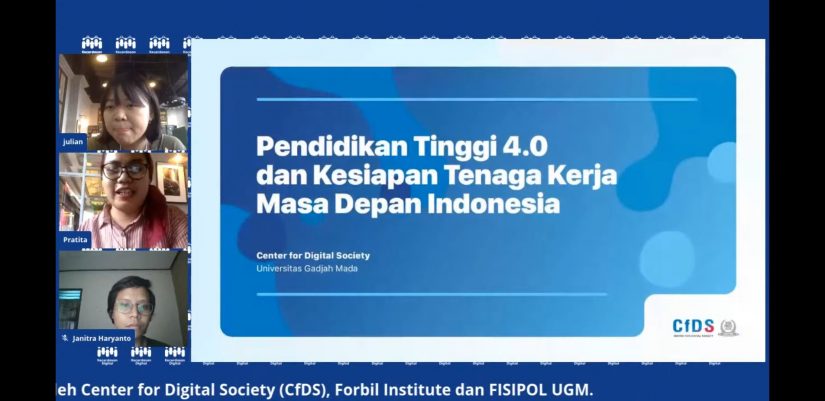
Yogyakarta, August 27th 2020—In this semester, Center for Digital Society, Forbil Institute, and Faculty of Social and Political Sciences UGM collaborated to organize Digital Intelligence Lecture Series. Digital Intelligence Lecture Series is an elective course for the students who already completed their first year (entering the third semester). Apart from holding regular lecture classes, Digital Intelligence Lecture Series also provides online discussions with a speaker that relates to digital intelligence issues. As an opening and introduction class, Digital Intelligence Lecture Series held the first online discussion called ‘Observing the Position of Indonesian Students in the Digital Age Job Market’.
The material presented in this online discussion was taken from research ‘Higher Education 4.0 and the Readiness of Indonesia’s Future Workers’ which was conducted by CfDS from April 2019 to February 2020. As implied by the title, this research tried to see the readiness of Indonesian students and higher education institutions in preparing themselves to enter the increasingly technology-based job market. This research tried to see the problem from the point of view of two actors, they were students and higher education institutions. Therefore, the explanations were done in two stages by two different speakers.
The result of this research began by explaining the students point of view, it was presented by Anisa Pratita Kirana Mantovani, Research Manager of CfDS. From the answers which were covering gadgets ownership, internet connection, IT skills, and student confidence to enter the job market after completing higher education, the researchers found many unique findings. from personal information such as expenses for the internet only, Tita explained that there were diversities in there. Although most respondents spend the range of one hundred to two hundred thousand on the internet, there were also respondents who stated that they needed up to one million.
The other unique findings from students point of view arose in a discussion about IT skills of the respondents. There were different and varied IT skills among Indonesian students if viewed from several groupings such as gender (women and men), their majors (STEM and non-STEM), and university rankings (high, medium, low). The highest IT skills score of Indonesian students itself was still at the basic level, continued with medium level, and high level. Even so, the level of confidence of Indonesian students to enter the job market in the era of the industrial revolution 4.0 exceeds the scores of IT that the skills students have.
In contrast to the results of student perspectives obtained through online surveys, the results of the perspective of higher education institutions were obtained by interviewing rectors or actors at the level of higher education policy makers who are related to the curriculum. Janitra Haryanto, Project Officer of CfDS, explained more about unique findings on the results of the higher education institutions point of view.
Of all 19 higher education actors who were successfully interviewed, all of them showed that each university already had basic digital education infrastructure and facilities, such as wifi and online libraries. Meanwhile, for advanced digital facilities such as online education platforms, only four universities have them.
Even so, all respondents were confident that their institutional graduates are capable of facing the industrial revolution 4.0. However, this did not erase the pessimistic narrative of some policy makers at the Indonesian higher education level regarding the readiness of the Indonesian education system to produce graduates who are able to compete in the era of the industrial revolution 4.0. In addition, researchers also found that there were differences in principles and perceptions regarding the strategies and roles of higher education institutions in preparing students to compete in the job market.
After the two speakers presented their interesting findings in this study, Yuliana Khong—the moderator and also the Project Officer of CfDS, read out some of the questions written by the discussion participants in the Youtube and Facebook comments column. The participants’ questions focused not only on the research results presented, but also related to the Digital Intelligence Lecture Series. Ending the entire first online discussion with several points of conclusion, the moderator officially closed the event at 05.00 p.m. Reruns of this first online discussion of the Digital Intelligence Lecture Series can be watched on the CfDS UGM Youtube channel.
